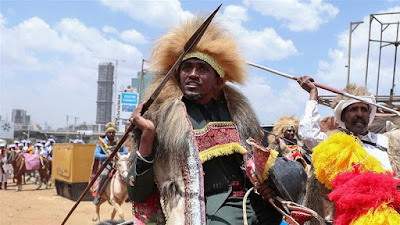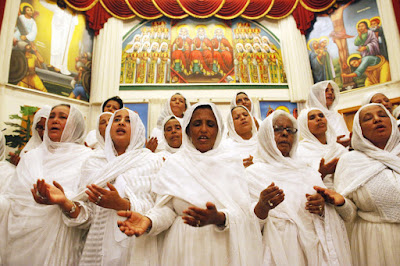On the evening of Monday 29 June, popular Ethiopian singer and champion of Oromo interests Hachalu Hundessa (36) was assassinated in Addis Ababa, in Gelan Condominiums, shot as he got into his car at around 9:30 p.m. Addis Ababa Police Commission Commissioner, Getu Argaw, reportedly told Ethiopian Broadcasting Corporation that police had arrested an unspecified number of suspects. Hachalu is survived by his wife of 10 years, Fantu Demissie, and their two daughters.
Hachalu’s protest songs became anthems for millions of ethnic Oromo during the years of anti-government protests which commenced in December 2015 and culminated in February 2018 in the resignation of Prime Minister (PM) Hailemariam Desalegn. A month later, the ruling Ethiopian People’s Revolutionary Democratic Front (a four-party coalition) elected Dr Abiy Ahmed Ali (41) as Ethiopia’s first ethnic Oromo Prime Minister. With an ethnic Oromo Muslim father and an ethnic Amhara Ethiopian Orthodox Christian mother, Dr Abiy is a convert to evangelical Protestant Christianity. He is a former soldier, having served as a colonel in intelligence and communications. He is also a technocrat and cyber warfare expert. He has a PhD (2017) in conflict resolution from the Institute for Peace and Security Studies, Addis Ababa University [see: RLM June 2018]. PM Abiy’s reforms have been breathtaking, and is brokering of peace with Eritrea [see: RLM July 2018] earned him a well-deserved Nobel Peace Prize (2019).
Like PM Abiy, Hachalu Hundessa was an ethnic Oromo Christian (Ethiopian Orthodox). While Hachalu supported PM Abiy’s vision of a united Ethiopia and was critical of militant Oromo ethnic nationalism, he had also made provocative, xenophobic remarks about non-Oromos in Addis Ababa. So while Hachalu might have been an Oromo champion and icon, hard-line Oromo ethnic separatists doubtless also viewed him as a problematic irritant.
 |
| Hachalu Hundessa rides a horse in traditional costume during the 123rd anniversary celebration of the Battle of Adwa where united Ethiopian forces, led by Oromo horsemen, defeated the invading Italian forces [see RLPB 492 (5 March 2019)]. [image: Tiksa Negeri/Reuters, Addis Ababa, 2 March 2019] |
VIOLENCE ERUPTS
Hachalu’s assassination has triggered some of the worst ethnic-religious violence seen in Ethiopia in recent times; and the crisis is far from over. Evidence indicates that the pogroms were organised with the intent to destabilise the nation and derail PM Abiy’s reform agenda.
Initially, suspicion fell on the Tigrayan People’s Liberation Front (TPLF) which has long resisted PM Abiy’s reforms and peace-making. As it turns out, that was not the case.
On Friday 10 July, Ethiopia’s Attorney General Adanech Abiebie told a press conference in the capital Addis Ababa that two of three suspects in the killing of Hachalu Hundessa were now in custody. The shooter, Tilahun Wami has reportedly confessed that the assassination was commissioned by the Oromo Liberation Front (Shane Group), a militant faction of the Oromo Liberation Front.
This is the group believed to be responsible for the abduction of 17 mostly ethnic Amhara youths – 12 of whom are students at Dembi Dollo university, and 14 of whom are girls – in western Oromia in December 2019. The whereabouts of these youths remains unknown.
Though widely reported as “ethnic clashes”, that description does not do justice to the truth of what really happened. Commencing before dawn the next morning (30 June), gangs of Oromo nationalists specifically targeted ethnic Amhara Ethiopian Orthodox Christians living in some 40 districts of Oromia region. According to official reports, the toll to date is 239 dead with some 300 wounded. More than 3,360 Amhara Christians are now displaced, with multitudes seeking refuge in churches. The military was deployed, and some 4,700 arrests made (1,600 in Addis Ababa).
According to Archbishop Habune Henok, whose diocese is in the West Arsi zone of Oromo regional state, told Borkena (Ethiopian media) that the violence began at 4 a.m. before he had even heard of Hachalu’s assassination.
Archbishop Henok speaks out about massacre of Orthodox Christians,
Borkena, 12 July 2020
(excerpts)
“[The Archbishop] confirmed 19 Christians massacred across 11 districts in Arsi are all Orthodox Christians, and they were killed savagely. Elder and youth were targeted in the killing. [Some were] hacked to death. Others were stoned and clubbed to death. . .
“In Arsi Negele, one person (who is a member of the Orthodox Church) was hanged upside down after he was killed. . .
“In terms of destruction of property, 72 cars and 934 businesses have been destroyed including clinics and four schools from Kindergarten to junior school levels (in Shashemene town and Arsi Negele).
“According to Archbishop Henok, the owner of the schools are members of the Orthodox Church and many of those whose properties were destroyed were known for their social services in the church.
“In addition to businesses, 493 residences have been burned – and all of them are followers of the Orthodox Church.
“The Holy Savior Church in Kokosa, a district in Western Arsi Zone, is burnt down to the ground with all the Holy Icons and other sacred items in the church.”
The Archbishop insists that these were not simply “ethnic clashes”.
“He said ethnic identity was used as a cover only. The targets were Christians, and that the attack was a coordinated one, he said.
“In the region where the massacre took place, there appears to be intolerance towards the followers of Ethiopian Orthodox Tewahedo Church.”
Also on Tuesday 30 June, violence erupted in the capital over burial arrangements for Hachalu’s body. Oromo nationalists demanded he be buried in the capital Addis Ababa, but police suspected this was merely a ploy to bring insurrection to the capital. On the other hand, Hachalu’s family, with the support of the government, insisted he be buried in his birthplace Ambo, 100km west of Addis.
Security personnel were forced to intervene when a group of Oromo nationalists – among them Jawar Mohammed (an Oromo nationalist leader and fundamentalist Muslim) – attempted to intercept and snatch the body en-route to Ambo. A policeman was shot and Jawar Mohammed (34) – who despite his citizenship issues wants to contest the next election in opposition to Dr Abiy [see RLPB 526 (30 Oct 2019)] – was arrested, along with around 30 of his supporters.
Jawar Mohammed remains jailed, alongside another prominent Oromo politician, Bekele Gerba. His appearance in court sometime later this month is sure to be explosive.
Social media reveals how Jawar’s Oromo nationalist supporters and financial backers in the diaspora – in particular, thousands of ethnic Oromo and Somali Muslims in Jawar’s former home base of Minnesota, USA – encouraged and cheered on the killings from afar.
Ethiopia’s social media captures Oromo xenophobia killings Live
By Teshome Borago, for Borkena, 3 July 2020
(excerpts)
“Many of [the] anti-Abiy Oromos funding the OLF-Shane militant operations inside Ethiopia live in Minnesota and diaspora; so their social media activity suddenly picked up at the end of June. They successfully organized protest rallies in Minneapolis and other western towns while posting disturbing nativist comments online promoting violence. Most Social media Oromo comments said ‘Time to remove settlers from Oromia’, ‘burn them out’, ‘free Oromia’, ‘Abiy is traitor’, ‘Abiy must go’, ‘Kill all neftegnas (non-Oromos) in Oromia!’ Etc.”
Gradually, posts started appearing from the relatives of victims:
“One post in Amharic was by Amman Chiksa, who said ‘several fathers of my friends just got killed’, in the same town of Asasa, Arsi. ‘They were murdered for no reason. They are elderly and all they do is go from home to church and back, everyday.’ Then the grief-stricken person asks, ‘who would commit such savagery?’. . . ‘why would anyone burn down a clinic?’, ‘why would anyone burn down houses where the elderly congregate?’
“Ethiopians online posted condolences of support and felt sorrow for the senseless killings in Oromia region. The man then said, ‘my mother survived as she fled in hiding . . . may God help us,’ and added ‘Asasa and other parts of Arsi currently look like Mogadishu’.”
As Teshome Borago writes the Borkena (3 July 2020) article above: “Most of the crisis today is connected to the apartheid system called ethnic-federalism, also known as Zenawism [after its founder, PM Meles Zenawi Asres] which tried to segregate Ethiopia by tribe since 1991. It was a faulty system designed to address past injustices, but it is now believed to have caused the most civilian death, displacement and destruction in Ethiopian history in less than 30 years.”
| Ethiopia’s Oromia Region An enlarged map can be downloaded here (reliefweb 27 March 2013) |
THE BATTLE FOR ETHIOPIA
This is a battle between the vision of a strong and united, multi-ethnic, multi-religious Ethiopia versus the dream of ethnic nationalists to rule themselves in independent states. Three decades of ethnic federalism has hardened ethnic identities, resulting in ethnic nationalism and separatism. These movements tend to be led by ambitious politicians (often self-centered megalomaniacs) whose aim it is to ride to power on the back of victimhood narratives.
In a country like Ethiopia where people have moved around, lived together and intermarried for centuries, ethnic nationalism establishes ethnic minorities – minorities at risk of discrimination, subjugation, slaughter and ethnic cleansing as is being demonstrated so tragically in Oromia.
It must be stated that Jawar Mohammed’s Oromo ethnic nationalism is further fueled by his Islamic worldview, which is no doubt why many Oromo Christians (like Hachalu Hundessa) tend not to support it.
EXTERNAL FORCES
In an interview with FRANCE 24 (10 July), Zadig Abraha, the Ethiopian minister in charge of democratization, accused “external forces” of playing a role in the recent violence in Oromia region.
While making it clear that investigations were ongoing, Zadig also accused forces opposed to changes ushered in by Prime Minister Abiy Ahmed of being behind the unrest. Specifically, he said, “the old regime together with forces [whose] interests are aligned with it, are working to make sure that reform gets aborted. And in this game, external forces are also involved.”
One such “external force” that would gain from PM Abiy’s demise is Egypt, which is engaged in a heated dispute with Ethiopia over its construction of the Grand Ethiopian Renaissance Dam (GERD).
Egypt warns of ‘existential threat’ from Ethiopia dam
Aljazeera, 30 June 2020
(excerpts)
“At a virtual meeting of the UN Security Council on Monday, Egypt’s Minister of Foreign Affairs Sameh Shoukry warned of conflict if the UN fails to intervene.
“Filling the dam without an agreement could bring the standoff to a critical juncture. Both Egypt and Ethiopia have hinted at military steps to protect their interests, and experts fear a breakdown in talks could lead to open conflict.
“One analyst, however, believes it is unlikely any of the countries involved will resort to force.
‘Ultimately, especially in the long run, the only way for Egypt to secure those [water] supplies is via cooperation with its upstream neighbours, very much including Ethiopia,’ said William Davison, a senior analyst at the International Crisis Group.
‘If this escalated into any form of conflict, it’s going to make it much, much more difficult for the parties to overcome the remaining obstacles to reaching an agreement on the GERD, and it really could set back relations in the long term,’ he told Al Jazeera.”
Davison’s assessment makes a lot of sense; however it does not preclude the possibility that Egypt might seek to facilitate regime change in Addis Ababa.
For more on the dispute over the Grand Ethiopian Renaissance Dam, see:
Egypt Warns Ethiopian Mega-Dam May Provoke Conflict, Crises
By Sonal Patel, Power Magazine, 2 July 2020
Ethiopian Emperor Menelik II ruled, expanded and modernized Ethiopia from March 1889 to his death in December 1913. In seeking support from European powers he explained Ethiopia’s predicament: “Ethiopia has been for fourteen centuries a Christian island in a sea of pagans”.
Indeed it is! So, apart from Egypt, it is not difficult to think of other “foreign forces” which might likewise be interested in fueling ethnic-nationalism and fanning the flames of unrest for the purpose of destabilising the government of PM Abiy. Some would even fantasize about dismantling, shrinking and challenging the very existence of that “Christian island”. Doubtless many would be especially excited about the prospect of supporting a committed Islamist such as Jawar Mohammed.
It is highly likely that fundamentalist Islamic jihadists in Egypt and Sudan, as well as Islamic irredentists in Somalia (who claim much of Ethiopia’s Eastern/Ogaden Region as belonging to Somalia); along with transnational jihadist organisations — in particular Islamic State which is already recruiting for a jihad is Ethiopia [see RLPB 520 (18 Sept 2019)] — may actually see Ethiopia’s crisis as an opportunity not to be missed.
Who knows? Even Turkey’s belligerent and Islamist President Erdogan might be willing to contribute some weapons and Syrian fighters for the cause (as he is doing in Libya). Or the Iranians; after all, Iran is already busy in Africa.
Not only is Ethiopia a Christian island in a sea of Islam, but Dr Abiy Ahmed is at this moment a reforming prime minister in a sea of enemies – deadly enemies with lots of equally deadly potential friends.
We can only hope and pray that the government of PM Abiy will find that it too has friends that will understand the government’s predicament back its exalted goals.
The situation demands vigilant monitoring and aggressive advocacy.
————————————-
Elizabeth Kendal is an international religious liberty analyst and advocate. She serves as Director of Advocacy at Canberra-based Christian Faith and Freedom (CFF) and is an Adjunct Research Fellow at the Arthur Jeffery Centre for the Study of Islam at Melbourne School of Theology.
She has authored two books: Turn Back the Battle: Isaiah Speaks to Christians Today (Deror Books, Melbourne, Australia, Dec 2012) which offers a Biblical response to persecution and existential threat; and After Saturday Comes Sunday: Understanding the Christian Crisis in the Middle East (Wipf and Stock, Eugene, OR, USA, June 2016).


